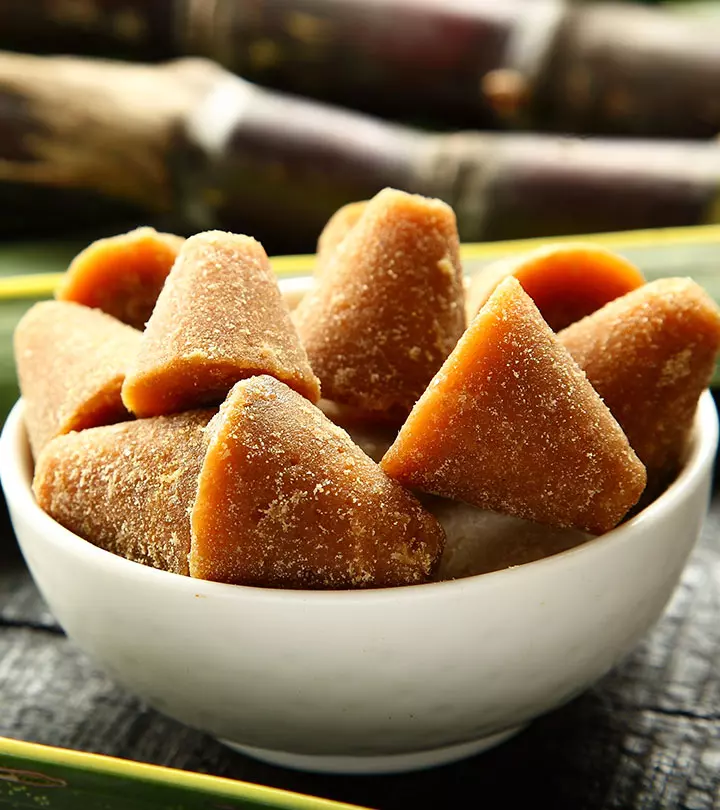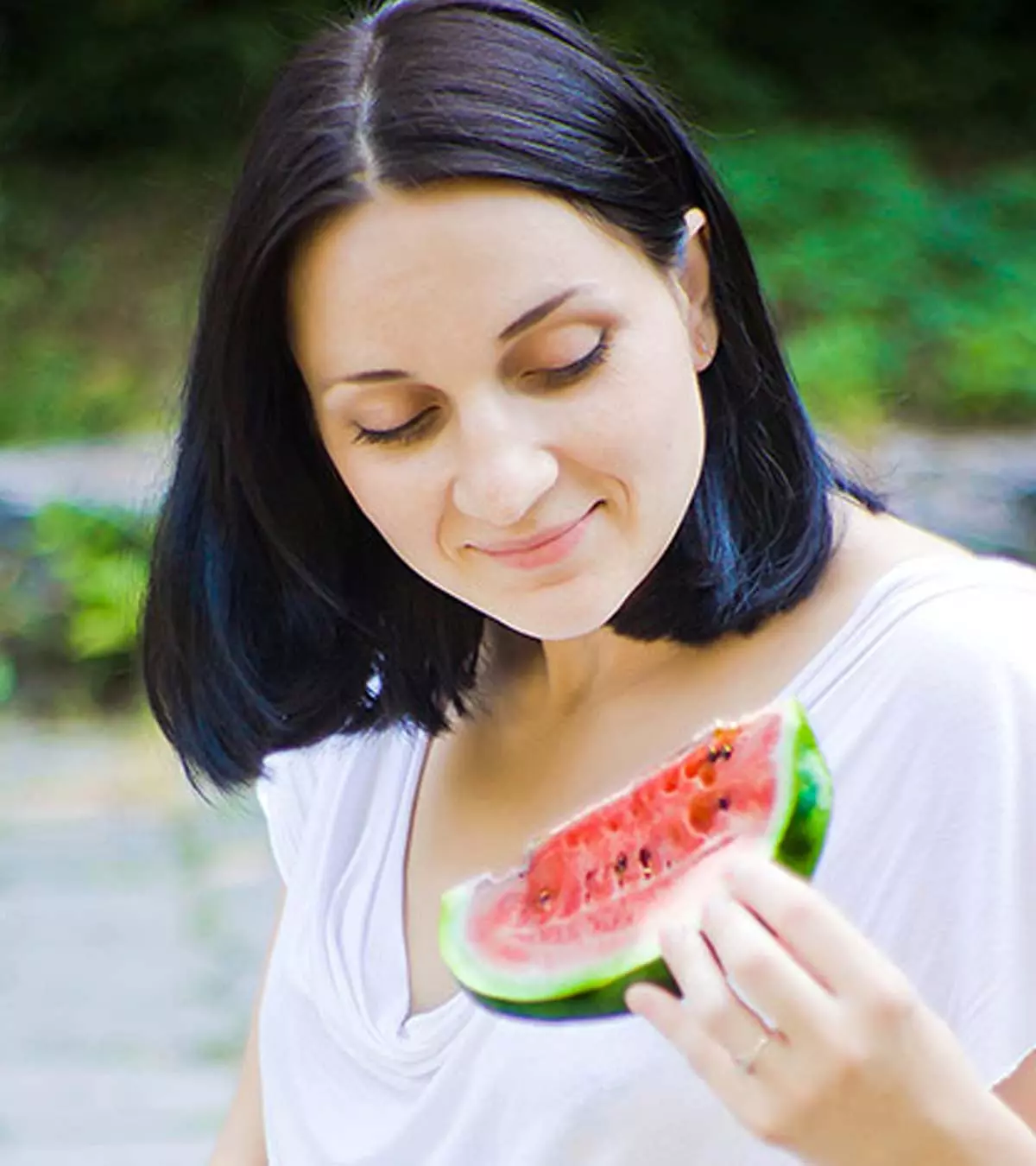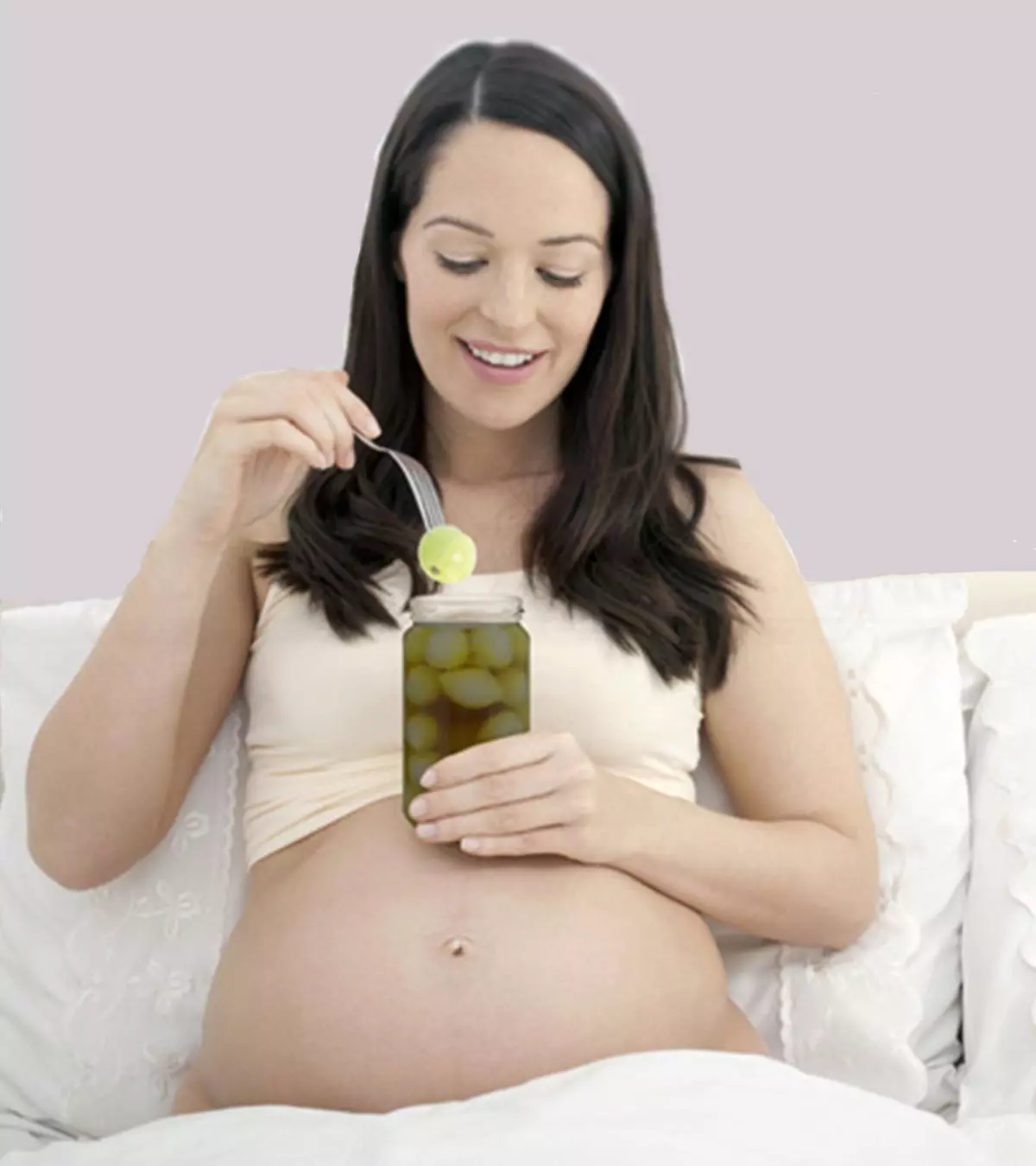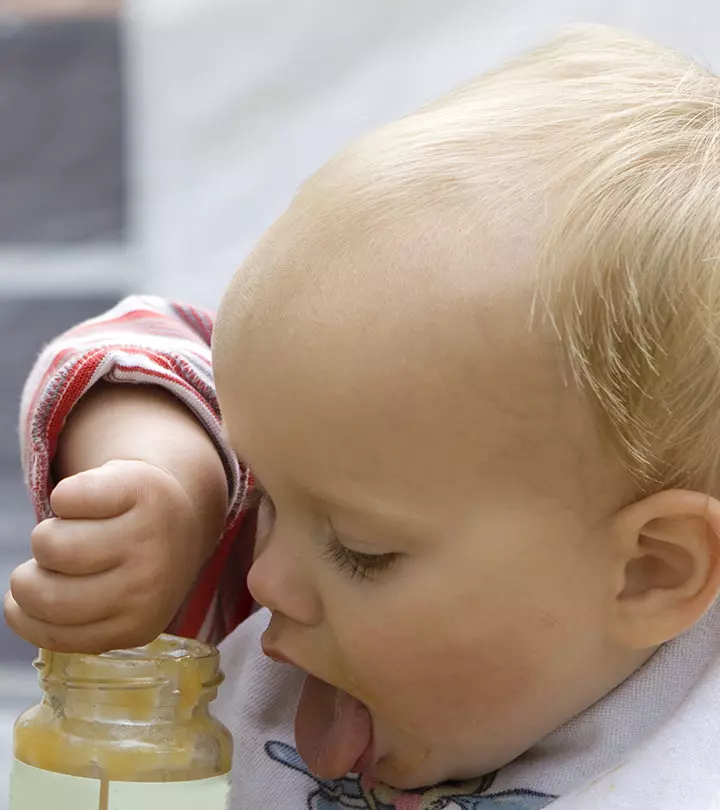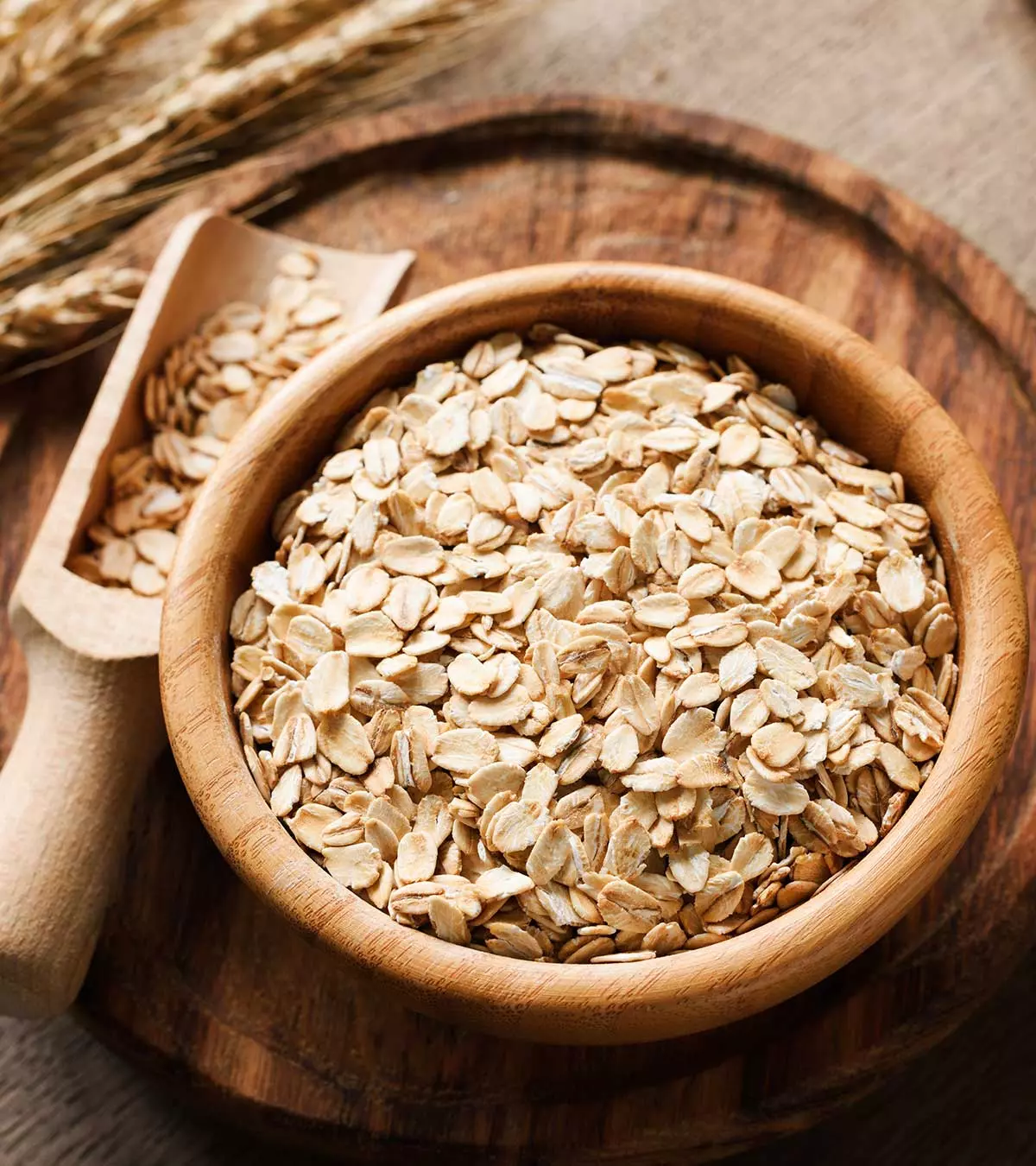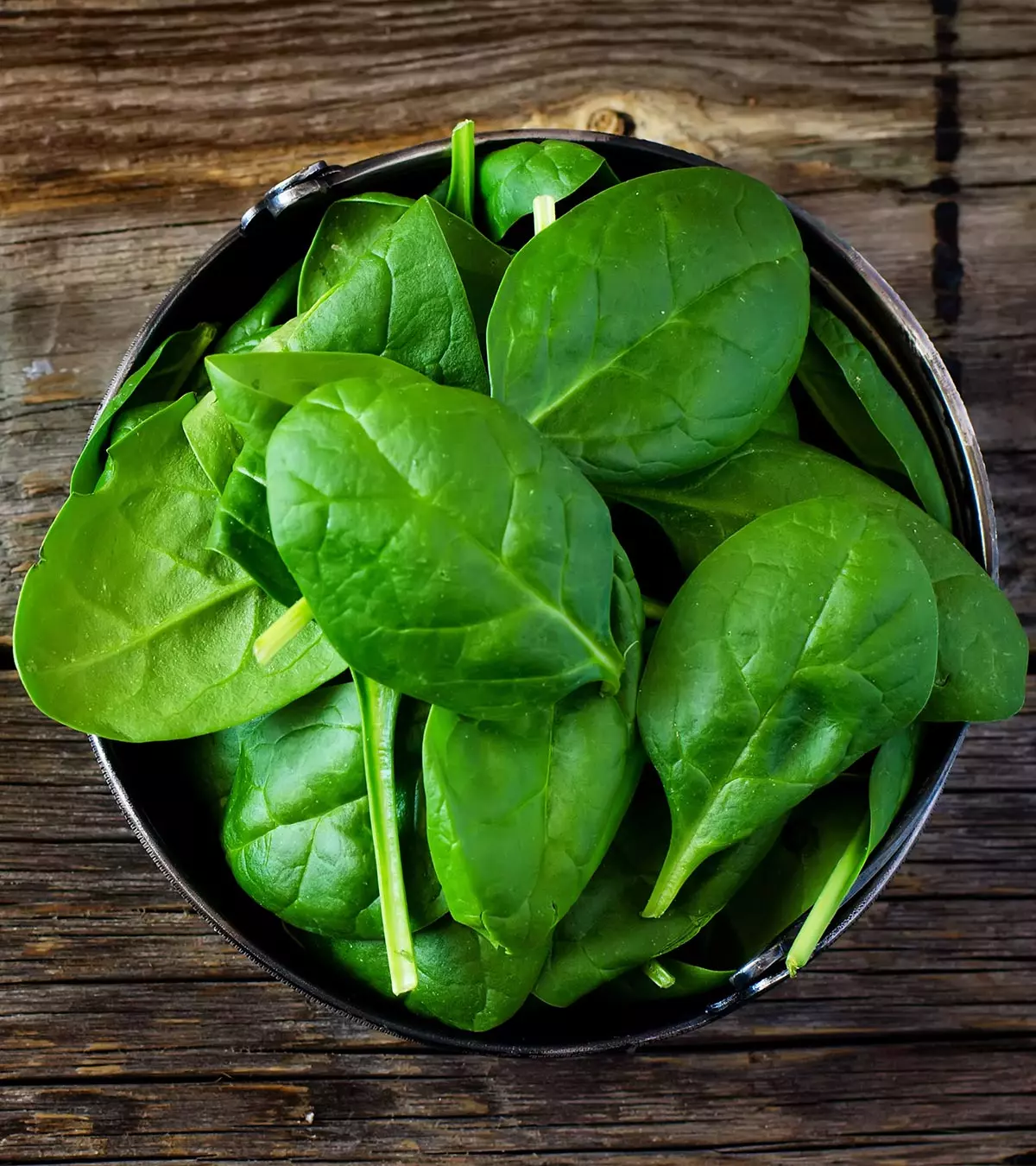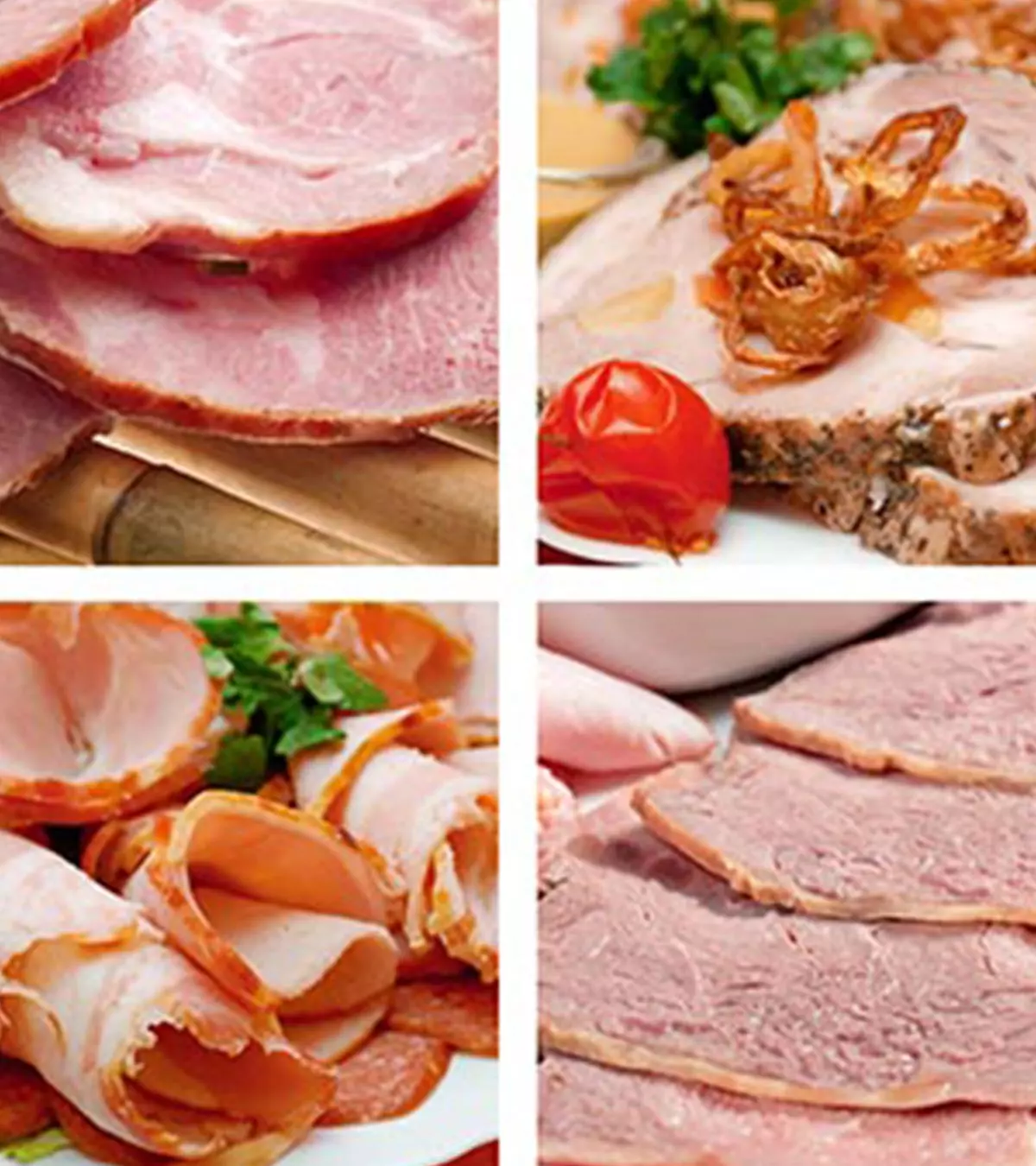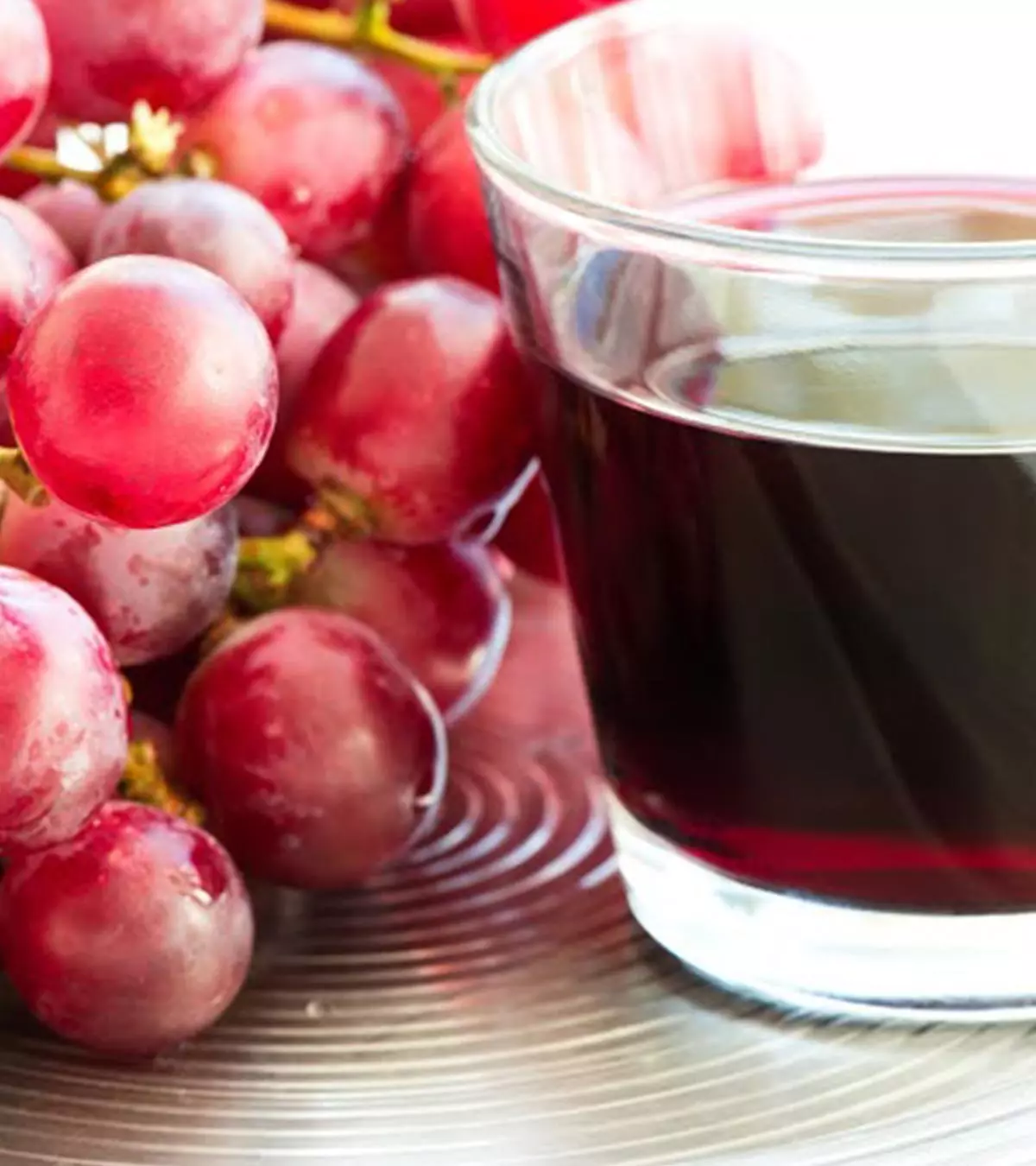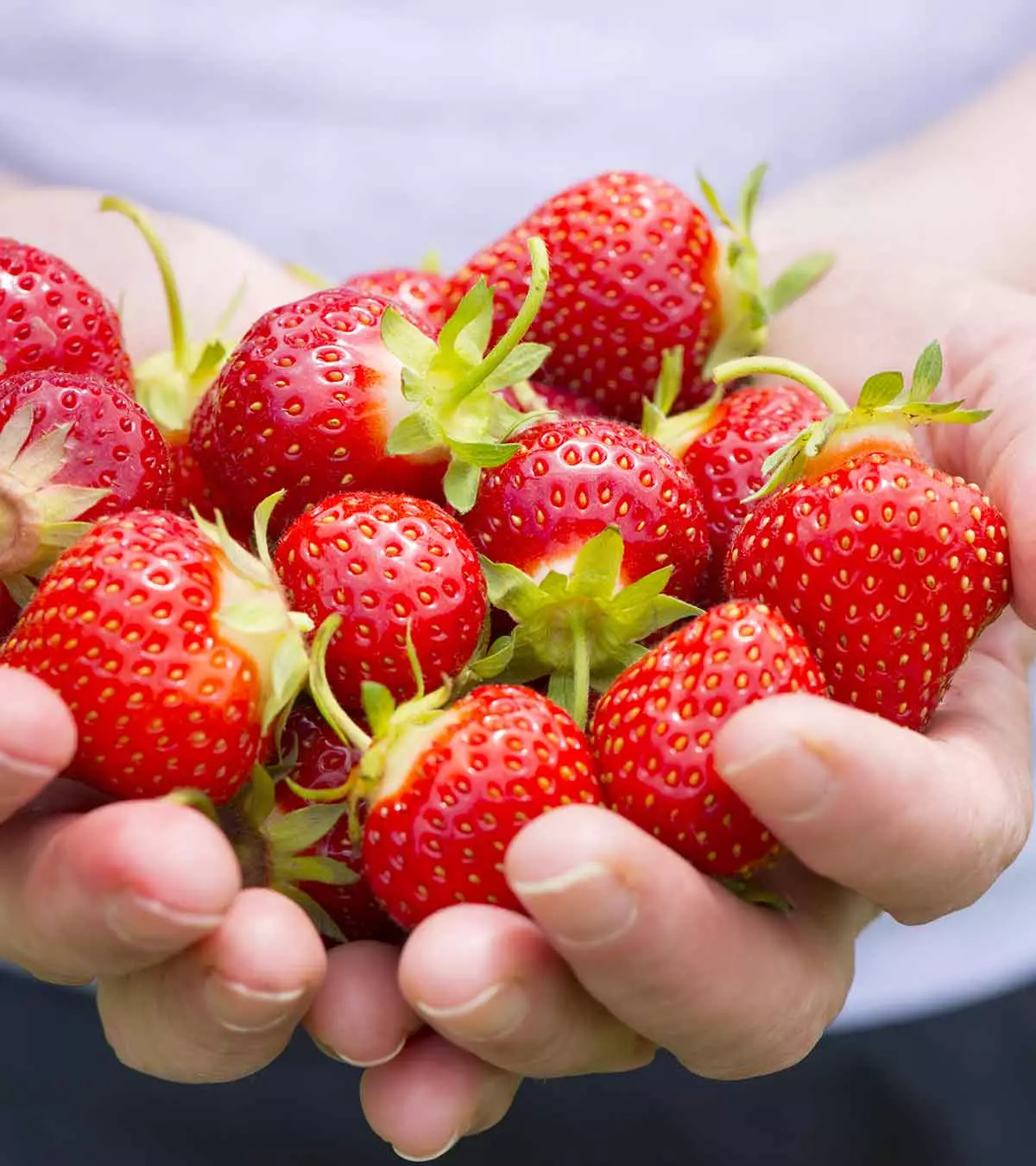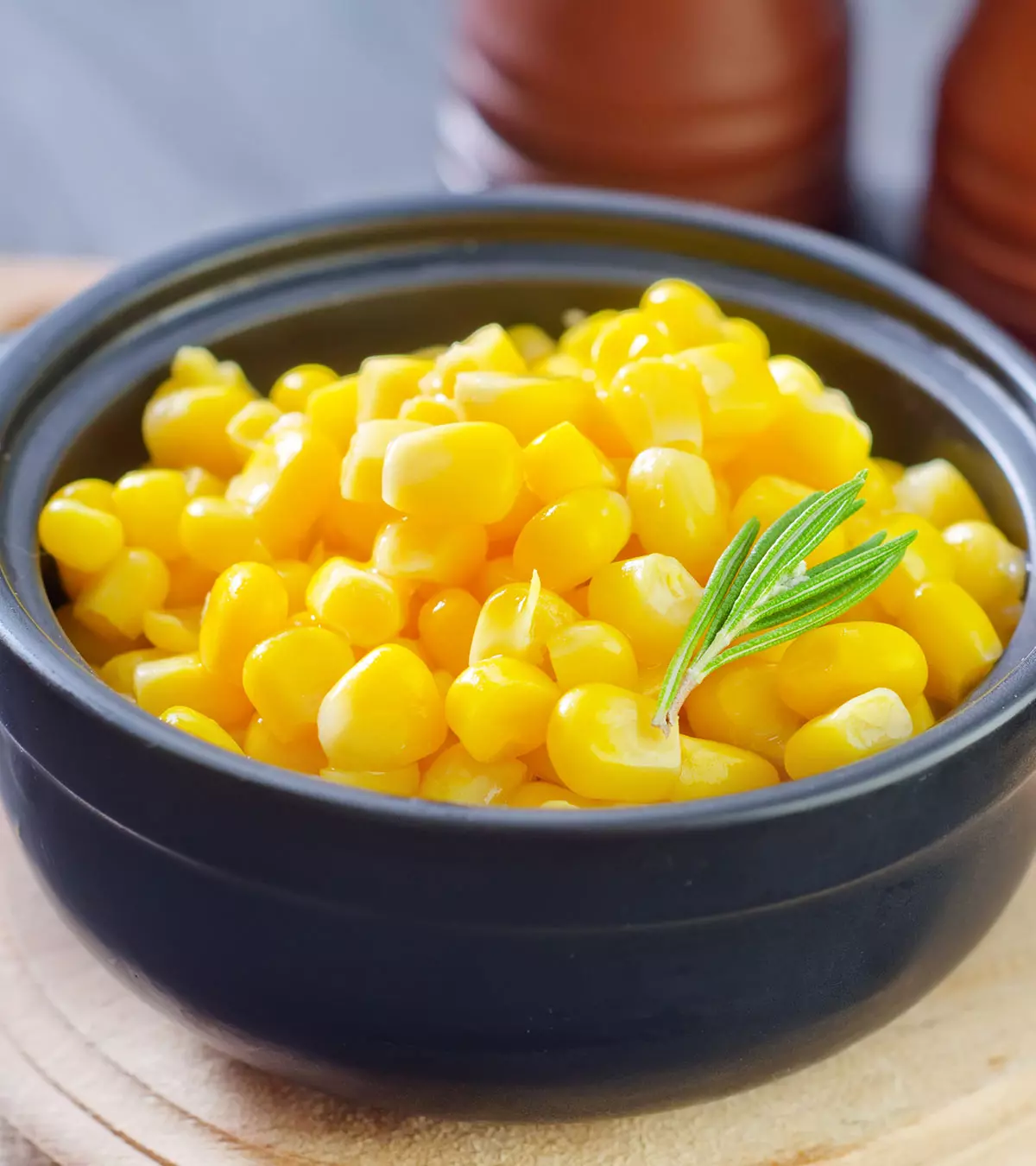
Image: Shutterstock
Corn, also known as maize, is a sweet-tasting grain rich in carbohydrates and fiber. Besides, it contains protein and several micronutrients that can effectively contribute to a baby’s nutritional requirements. But is corn for babies safe? Since corn has high amounts of insoluble fiberiA food component that adds bulk to the stool and helps food pass more quickly through the intestines. , you might be wondering if babies can digest corn comfortably. So, keep reading to know about corn’s safety for babies, its possible health benefits, and some age-appropriate corn recipes for babies you can try at home.

Key Pointers
- Corn or maize is rich in carbohydrates and fiber, but it is not recommended to introduce corn as a first solid food for babies.
- Babies with a history of corn allergy or eczema may have corn after one year with the doctor’s approval.
- Pureed corn should be offered initially and then creamed corn when the baby is around 18 months of age.
- Symptoms of corn allergy include skin rashes, nausea, stomach cramps, runny nose, asthma, and anaphylaxis (rare).
- When considered safe, corn can help in weight gain, growth, and development, and it improves digestion in babies.
- Organic corn with green husks, frozen corn, or canned corn are preferred varieties, and they should be stored in the refrigerator in an airtight container.
Can Babies Eat Corn?
Corn is safe for your baby, but you cannot make it a part of his first solid food. The American Academy of Pediatrics (AAP) recommends that you give the baby conventional first foods such as cereals, fruit, and mashed vegetables before adding corn to his diet (8).
If your family has a history of corn allergies, you need to avoid it until the baby is grown enough to sustain. Also, babies with eczema should not be given corn, unless your doctor okays it.
When And How To Include Corn In A Baby’s Diet?
According to the American Academy for Pediatrics (AAP), corn can be introduced after six months of age once you begin weaning and the baby begins to consume solid foods (9). You should start with one to two tablespoons of pureed food, including corn puree for babies aged 6-months (10). You may gradually increase the serving size.
However, if you are worried about the allergies, wait until he turns one year old. Also, corn is difficult to digest, so it is advisable to delay it until his digestive system improves.
Eva De Angelis, an Argentina-based licensed dietitian nutritionist, says, “While corn is generally safe because it is high in fiber, it may upset your baby’s stomach, causing gas and bloating. In addition, feeding your baby too much corn may cause diarrhea. This is why sometimes dietitians recommend waiting until your baby is 12 months old to introduce corn to their diet. Yet, pureed corn is safe to introduce from six months old.”
Here are various ways you can choose to feed corn for babies:
- Since babies are unable to eat whole corn kernels as they are raw, offer it to them raw or cooked, and always give strained corn puree to babies (11) (12).
- To prepare corn for babies, steam or boil the corn kernels and then blend it with breastmilk to make a smooth puree.
- For parents who follow baby-led weaning instead of spoon feeding, offering spoons preloaded with corn puree can help.
- If giving corn flour, the AAP recommends always mix it with breastmilk and not water (13).
- You can move on from puree to creamed corn when your child grows into a toddler around 18-24 months.
- Once he is two years or more and learns to use his newly grown teeth to chew, you can give him kernels to eat but ensure that he is chewing them.
Maize may not be the ideal baby food as it does not have a very high nutritional value. If you have to choose between corn and healthier food, go for the latter and wait to introduce corn as finger food in later months.
Nutritional Values In Corn
Corn is high in B vitamins: thiamin, niacin, pantothenic acid (B5), and folate. It contains dietary fiber, minerals, magnesium, and phosphorus at moderate levels. This table provides the nutritional values of 100gms of yellow corn grains (14):
| Nutritional value per 100 g (3.5 oz) | ||
|---|---|---|
| Energy | 360 kJ (86 kcal) | |
| Carbohydrates | 74.3 g | |
| Protein | 9.42 g | |
| Fat | 4.74 g | |
| Vitamins | ||
| Vitamin A equiv | 11 μg | |
| lutein zeaxanthin | 1360 μg | |
| Thiamine (B1) | 0.385 mg | |
| Riboflavin (B2) | 0.201 mg | |
| Niacin (B3) | 3.63 mg | |
| Pantothenic acid (B5) | 0.424 mg | |
| Vitamin B6 | 0.622 mg | |
| Folate (B9) | 19 μg | |
| Minerals | ||
| Iron | 2.71 mg | |
| Magnesium | 127 mg | |
| Manganese | 0.485 mg | |
| Phosphorus | 210 mg | |
| Potassium | 287 mg | |
| Zinc | 2025 mg | |
 Did you know?
Did you know?Benefits Of Corn For Babies
Corn offers certain benefits for your baby if you limit the intake to moderate levels.
Here are a few reasons why corn can be beneficial (14):
1. Helps in weight gain
About 100g corn contains around 350 calories. If your baby is underweight, a corn diet could help him gain some pounds. Even a baby with normal weight can be given this vegetable to maintain his weight after you stop breastfeeding him completely.
2. Body growth and development
Corn is rich in B complex vitamins. Thiamin supports nerves and brain development; niacin improves metabolism, especially of sugars, proteins, and fatty acids; and folate helps new cell development.
3. Muscle and nerve function
Corn contains phosphorus, potassium, magnesium, and iron. Phosphorus supports bone health; potassium and magnesium are necessary for muscle and nerve function. Iron improves brain development.
4. Protects blood cells
The presence of antioxidants (through vitamin E) makes maize good for protecting cells from damage. It contains phenolic compound ferulic acid, which is an anti-carcinogenic agent. Antioxidants prevent tissue and DNA damage in the body.
5. Improves digestion
The presence of fiber makes corn a good laxative. If your baby has frequent constipation issues, a few corn products like corn seeds and cornflour could resolve the problem.
Corn seeds are natural laxatives and can be used to relieve constipation (15). Cornflour is also good, but it needs to be whole cornflour and not refined.
“Boiled corn is better tolerated and can help your baby absorb all of the nutrients corn offers. Keep in mind that even if the corn kernels are fully cooked, they can pose a choking hazard to your baby. So, until they’re 12 months old, make sure to puree them as much as possible,” De Angelis suggests.
6. Good vision and skin
Yellow maize is rich in vitamin A, a source of beta-carotene that gives better eyesight. Beta-carotene, which is not a part of vitamin A, acts as an antioxidant that is good for the baby’s skin (16).
Effects Of Corn On Babies
The natural sugars in corn can become starch quickly, and hence corn is not considered beneficial for a baby. Its ill-effects broadly manifest in two ways:
- Allergies
- Intolerance
1. Allergies
According to US CDC’s National Center for Health Statistics 2025 data, 4.4% of children between 0 and 5 years in the US have food allergies (17). A child develops an allergy to corn due to the proteins present in the kernels. Lipid transfer protein (LTP) is a major cause of allergies as it stays on even after processing or heating the corn and post digestion (18). Other potential allergens are storage proteins and corn pollen present in the kernel.
Both corn and corn-based products could trigger allergies such as eczema and allergic rhinitisiInflammation of the nose caused by an allergen leading to itching, sneezing, and watery eyes. . However, corn does not figure in the top eight food allergens of the Food Allergen Labeling and Consumer Protection Act of 2004.
Here is a list of some corn products but it is not exhaustive as corn is used as an ingredient in several foods:
- cornstarch
- baking powder
- corn oil
- cornflakes
- corn tortillas
- popcorn
- vanilla extract
- confectioners’ sugar
- corn meal
- mannitoliA type of sugar alcohol used as a sweetener and medication.
- margarineiA spread used in baking and cooking for flavor..
- colour hominy
- lactic acid
- invert sugariA liquid sweetener made from table sugar and water.
- corn syrup
- caramel
- dextriniProducts formed by heating starch in the presence of moisture and acid.
- dextroseiSimple sugar made from corn or wheat.
- fructose
- maltodextrin
- sorbitoliA sugar alcohol that is slowly absorbed by the small intestine and may act as a laxative.
Corn allergy symptoms in babies
If you observe any of these symptoms in your baby, stop giving him corn immediately (1):
- Hives or a skin rash
- Nausea, stomach cramps, indigestion, vomiting, or diarrhea
- Stuffy or a runny nose
- Sneezing
- Headaches
- Asthma and in a worse case anaphylaxisiA severe allergic reaction causing breathing difficulty and loss of consciousness.
How to deal with corn allergy?
- The first obvious way to deal with the allergy is to avoid corn and corn-derived products.
- Give your baby home-cooked food because ready-to-eats can contain corn in any form.
- If the reaction is severe, take your baby to a doctor. They would administer epinephrine (adrenaline).
 Be watchful
Be watchful2. Intolerance
Intolerance is different from allergies as it reflects in the form of digestive problems in babies (19). Your baby could have the below symptoms if the baby is intolerant to maize:
- Bloating
- Gas
- Stomach pain
- Diarrhea
Intolerance could be short-lived when compared to allergies.
13 Tips To Select And Store Corn
Once you make sure that your baby is not allergic or intolerant to corn, you may begin to add it to his diet. Here are a few tips to select the best corn available in the market:
- Select fresh corn as it is the best way to consume the vegetable (20).
- Purchase non-GMO and organic corn harvested from a fresh, sustainably cultivated crop to reduce pesticide exposure and provide a healthier choice for your baby.
- Buy corn with husks on them as they protect them from heat, damage, and dirt during the harvest (20).
- Ensure the husks are not dry, as dried husks indicate stale corn. Fresh corn picked fresh from the stalk has a tight and green husk (20).
- The kernels need to be plump, firm, and shiny (20).
- Check the husk down the length to feel any signs of damage or spoilage, such as cavities or bulges (20).
- The tassels (brown hair-like things at the top) need to be sticky and glowing.
- Frozen corn may also be bought from reputable brands or sellers.
- If you need sweet corn, pick the fresh corn and process it within 2-3 hours as corn starts to lose its sweetness rapidly (21).
- If you opt to give your baby canned corn, check the ingredients to make sure that there is no added sugar in them. Canned corn has fewer proteins.
- Try to consume the corn within three days.
- Store them in an airtight container and put them in the refrigerator.
- Corn needs to be kept away from sunlight or heat because the sugars in corn convert to starch easily.
- If the supermarket allows, peel the husks of fresh corn back to check the tip of the corn and the quality of the kernels.
- If you are not allowed to peel the husk, press the corn with your hands to feel for its firmness. A firm corn is fresh and has healthy kernels.
Corn Recipes For Babies
Here are a few recipes for your baby to have corn in the tastiest way:
1. Corn puree
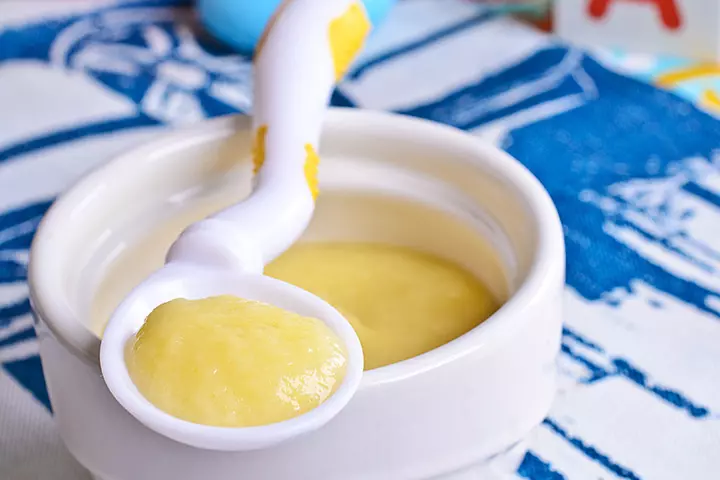
You Will Need:
- One cob of sweet corn
- A teaspoon of water, breast milk or formula
How To:
- Get the kernels off the cob. The best way to do it is by running a knife across the kernels.
- Put the kernels in boiling water and let them boil until they are soft.
- Make a puree by blending the kernels with a little water or milk. Add more water if you want a more runny consistency.
2. Pumpkin and cornmeal porridge
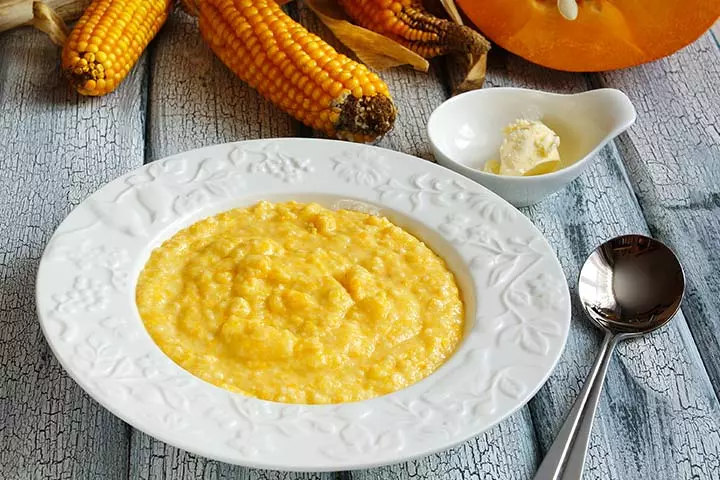
You Will Need:
- 1 cup water
- 1 cup milk
- 1 cup puréed pumpkin
- Yellow cornmeal (as needed)
- Water as needed
- One tablespoon brown sugar
- ½ teaspoon ground ginger (optional)
- A pinch of salt
How To:
- Add water, milk, and pumpkin in a pan.
- In another bowl, mix the cornmeal with some water. Make sure there are no lumps.
- Add the cornmeal paste and sugar to the pumpkin mixture, stirring until the mixture thickens.
- Add ginger and salt.
- Let it cook for another three to five minutes.
- Serve the warm corn porridge for baby.
 Quick tip
Quick tip3. Carrot, potato, and sweet corn puree
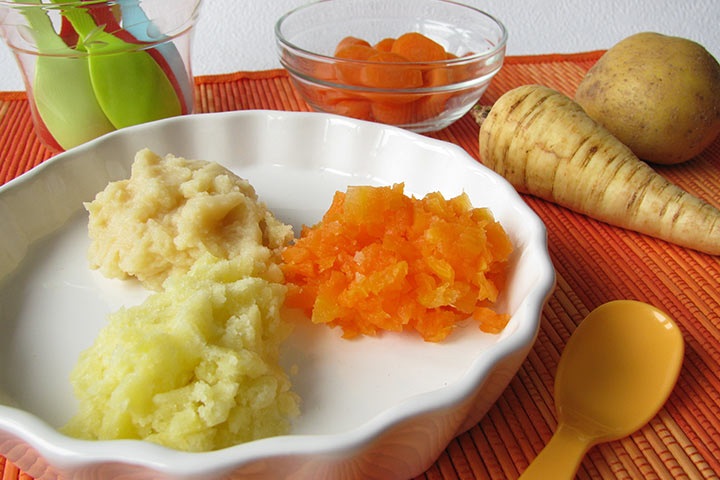
You Will Need:
- 1 carrot
- 1 potato
- 1 tbsp peas
- 2 tbsp of sweet corn kernels
- 4 tbsp of water
- 1 tsp of olive oil
How To:
- Sauté finely chopped carrot in an oiled pan until soft.
- Add potato, peas, sweet corn, and water.
- Let the mixture come to a boil and then simmer it for 15 minutes.
- Make this corn puree for baby that suits his palate.
4. Maize, apple, and sweet potato puree
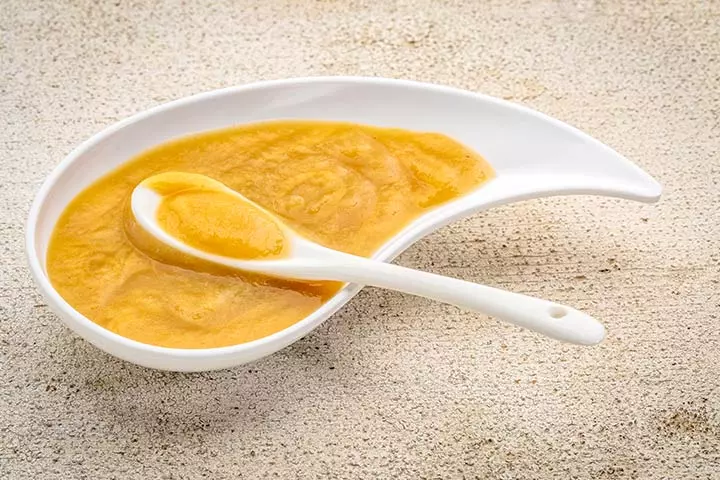
You Will Need:
- 2 cups corn kernels
- 1 apple peeled
- 1 sweet potato
How To:
- Cook the corn and steam the apple and sweet potato.
- Puree the three.
- Add some breast milk or formula to make it watery.
5. Corn and cauliflower puree

You Will Need:
- 2 cups corn kernels
- 1 cup chopped cauliflower
- 1 cup yogurt
- Pepper (optional)
How To:
- Cook the corn and steam the cauliflower.
- Puree both in a blender.
- Mix yogurt and pepper for taste.
6. Sweet corn soup

You Will Need:
- Fresh sweet corn
- A tablespoon each of finely chopped carrot, beans, broccoli, and spring onions
- Salt to taste
How To:
- Cook the corn cobs and remove the kernels after they cool down.
- Puree the kernels (keep a few kernels away for later use).
- Cook the other vegetables in a heavy bottom pan, with a thin layer of butter applied on it.
- After cooking for around two minutes, add the corn puree, a bit of salt, and bring it to a boil.
- Add water to bring the soup to the desired consistency.
- Add the remaining corn kernels and simmer.
7. Corn fritters
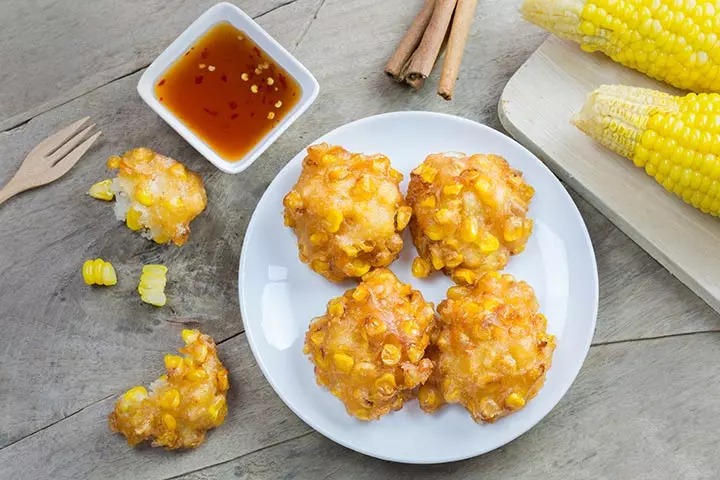
Age: Above 1 year
You Will Need:
- A small cup of multipurpose flour
- 2-3 tbsp milk
- 2-3 tsp sauce
- A cup of sweetcorn kernels
- Vegetable oil to cook
How To:
- Mix the flour and milk to make a smooth batter.
- Add the sauce and corn kernels.
- Apply a thin layer of vegetable oil on a frying pan, and spread small portions of the batter on it.
- Press them slightly while cooking and toss them a few times.
8. Cornflour cutlets
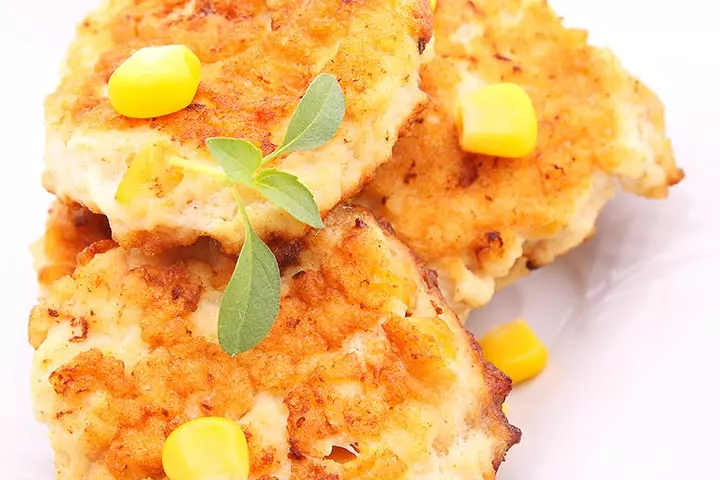
Age: Above 1 year
You Will Need:
- 2 tbsp cornflour
- 1 boiled potato
- 1 tsp lemon juice
- Salt to taste
- Pepper to taste
- Oil to fry
How To:
- Mash the boiled potato.
- Mix cornflour, lemon juice, and salt, and add a bit of pepper to it.
- Make the mix into small flat rounds, using your palms.
- Fry the rounds in a frying pan, tossing now and then.
Tip:
Cornmeal mixes well with mashed potatoes, carrots, apples, peas, brown rice, or rice meal, which are easily digestible.
9. Corn pancakes

Age: Above 1 year
You Will Need:
- 1 cup cooked sweet corn
- ½ cup jaggery or brown sugar
- ½ cup corn flour
- A pinch of salt
- 1/2 cup water
- Olive oil to fry
How To:
- Blend sweet corn, water, and jaggery to a smooth paste.
- Add cornflour and salt and mix thoroughly to make pancake batter.
- Brush a pan with olive oil and cook the pancakes.
10. Corn muffins

Age: Above 1 year
You Will Need:
- 1 ¾ Cup cornmeal
- ¾ Cup flour
- 1 tbsp baking powder
- 1 tsp baking soda
- ½ tsp salt
- ¼ cup maple syrup
- 1 1/2 cup buttermilk
- 2 eggs
- ¼ cup vegetable oil
How To:
- Mix the dry ingredients in a bowl.
- Add the wet ingredients in a separate bowl and thoroughly mix till well combined.
- Whisk together both the bowls’ contents.
- Grease mini muffin cups and pour the muffin batter into each.
- Bake in a preheated oven at 425 degrees for 15 minutes.
- Check if it is done with a toothpick (It is to be considered done if it comes out clean when inserted deep).
- Cool and serve.
Frequently Asked Questions
1. Can I give baby corn (Karo) syrup to my baby to cure constipation?
No, Karo corn syrup does not cure a baby’s constipation. It was once a home remedy for constipation, but the one that is available in the market these days does not work. It does not contain the necessary chemical structure that allows liquids into the intestine and loosens the stool.
2. Is corn syrup present in formula good for babies?
Avoid using corn syrup for babies as they are high in fructose, as it is an artificial sweetener. High fructose corn syrup (HFCS) does not do any good, but is used in the formula to sweeten the product.
In addition to making the babies overweight, HFCS could also set the tastes in the baby who would grow up to love over-sweetened foods.
Check for the ingredients before choosing a formula, and take the one that has low levels of corn syrup, among others.
3. Can my one-year-old baby eat cornflakes?
Babies one year and above can eat cornflakes for their breakfast. But choose the brand which has low levels of salt.
Also, if your baby likes rice flakes, wheat flakes, or oatmeal, consider giving these as they are better nutritional options than cornflakes.
4. Is cornstarch good for babies?
Starchy food, including cornstarch, is not advisable for babies who are yet to develop teeth. It is usually given to babies as it can be swallowed without being chewed. However, parents need to note that by swallowing it directly, the food is not being salivated. Also, babies’ digestive juices are yet to develop enough to digest cornstarch (2).
5. What is guinea corn? Can I give it to my baby?
Guinea corn is also known as sorghum or dura. It is rich in unsaturated fats, protein, fiber, and minerals such as phosphorus, potassium, calcium, and iron. It contains more antioxidants than blueberries and pomegranates (3). Babies can be given sorghum, but since it is a starchy food, balance it with other food groups.
6. Are corn puffs an ideal finger food for my infant?
Corn puffs are tasty, and your child might like them. But snack options such as fruits or nuts are more nutritious than puffs.
7. Can we use cornstarch to treat diaper rash?
Avoid using cornstarch for diaper rash. It is traditionally used as a powder on the rash, and is also made into a paste by mixing petroleum jelly with it, and then applied on the area. But it is not good to use cornstarch for the purpose as it supports bacterial growth. Instead, use baby powder.
8. Is cornflour used for a baby rash?
Cornflour can be applied to non-fungal rashes. In a fungal rash, it helps the fungus grow. So, determine the kind of rash before using cornflour.
9. What are the various types of corn?
There are six types of corn: dent, flint, pod, sweet, flour, and popcorn (22).
Dent: Dent or field corn is white or yellow in color. It is used in processed foods, industrial products, and as livestock feed.
Flint: Grown in Central and South America, Flint or Indian corn has a hard outer shell. Its uses are similar to those of dent corn. Its color can vary from yellow to red.
Sweet: Sweet corn is named so as it has higher natural sugars than the other varieties. Field corn has 4% sugar and sweet corn has 10%. It is used for direct consumption than as flour. It is rarely used as livestock feed. It is advisable to eat sweet corn immediately after being picked as nearly 50% of the sugar turns to starch within 24 hours (4).
Flour: Flour corn is one of the oldest types and, as the name suggests, it is used in baked goods. The kernels are soft and filled with starch. It is usually white, but can come in varied colors like blue.
Popcorn: This variety has a soft starchy inside that pops up when heated. The moisture inside the corn acts as steam that causes the explosion. Other types of corn also pop but not to the extent popcorn does, as the starch and moisture content is high in it.
Pod: Unlike other corn types, where the kernels are naked, or exposed, each kernel of pod corns is enclosed in long, membranous husks (glumes). It is a genetically mutated result of a maize plane and was, therefore, considered as the wild variety of maize before. Since opening each kernel is difficult, this variety of corn is not usually eaten.
10. Can a baby eat corn every day?
According to Katie Hlucny, a registered dietitian from Grand Forks, North Dakota, “Eating corn every day may not pose a problem for some babies; however, eating corn or any other food every day is not recommended. Babies should be exposed to a variety of foods daily. If a baby ate corn daily, they would miss out on other valuable nutrients from other foods and may get an upset stomach from the high-fiber content of corn.”
Babies six months and above can consume corn in well-cooked puree form. Initially, feed your baby small amounts, such as half a teaspoon, and watch for signs of allergy and intolerance. Once the baby adjusts to corn’s taste and digestibility, increase the amount gradually. Consuming corn as a part of a well-balanced diet can offer babies sufficient energy and nutrients, such as proteins, B vitamins, and fiber. Boiled corn kernels and corn-based foods, such as corn fritters and corn cutlets, can be used as finger foods for toddlers and older babies. Ensure older babies chew the kernels well. To reduce risks, mash the corn or cut it into small pieces.
Infographic: How To Select And Feed Corn For Babies?
Rich in dietary fiber, vitamins, and minerals, corn is a starchy vegetable and grain eaten worldwide for ages. So, if you wish to include these yummy kernels in your baby’s diet when they start solids, look at the infographic below for some useful tips to consider.
Some thing wrong with infographic shortcode. please verify shortcode syntax
Illustration: Can Babies Eat Corn? Safety Right Age And Health Benefits
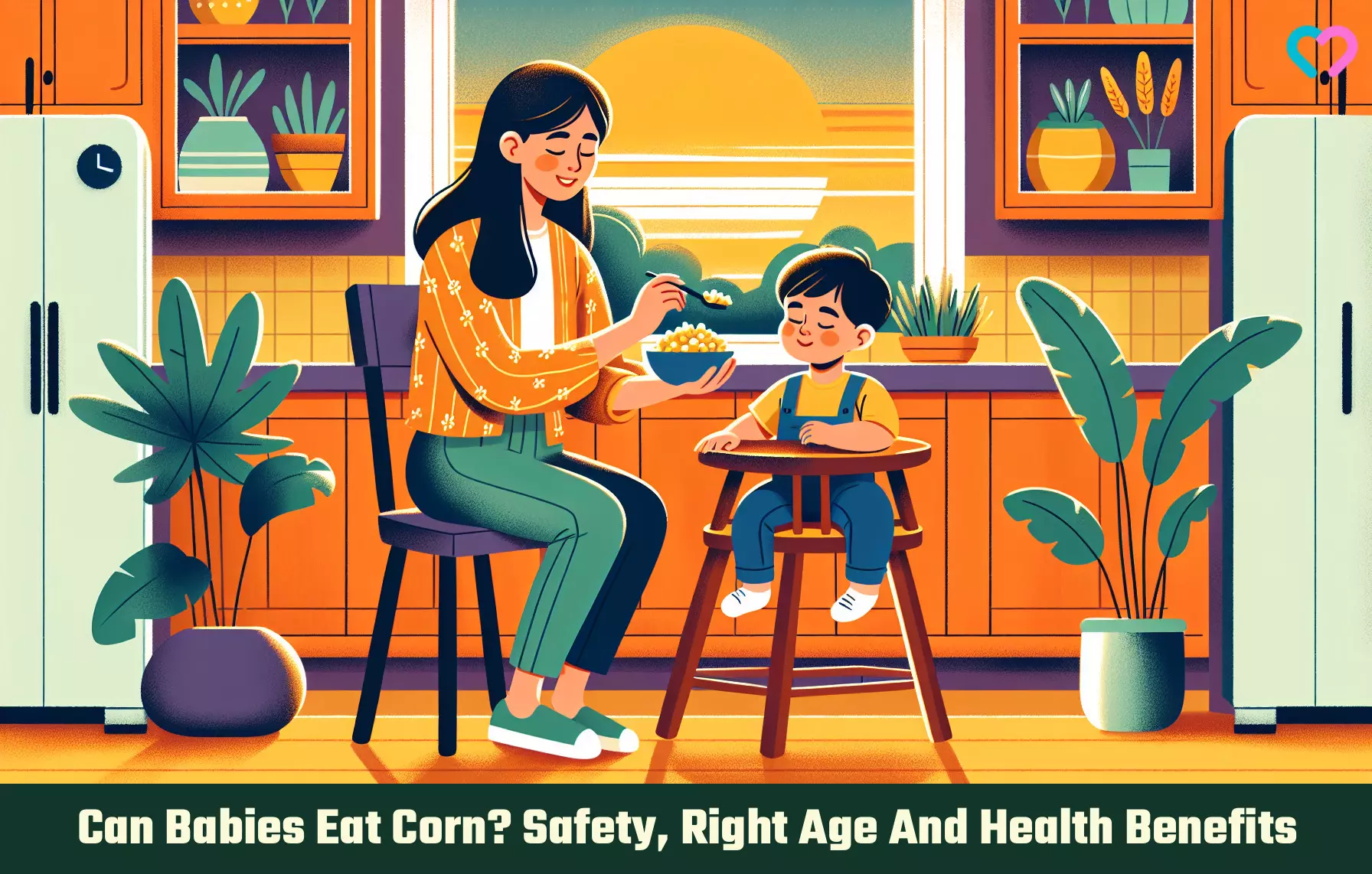
Image: Dall·E/MomJunction Design Team
References
- Corn Allergy Symptoms.
https://allergy-symptoms.org/corn-allergy-symptoms/ - No Starch for Infants.
https://www.soilandhealth.org/wp-content/uploads/02/0201hyglibcat/020126shelton.orthotrophy/020126.ch45.htm - Health Benefits of Guinea Corn – Sorghum.
https://www.gracengofoundation.org.ng/2015/10/health-benefits-of-guinea-corn-sorghum.html - Types of Corn.
https://www2.kenyon.edu/projects/farmschool/food/corntyp.htm - Who Guideline: Fortification Of Maize Flour And Corn Meal With Vitamins And Minerals.
https://apps.who.int/iris/bitstream/handle/10665/251902/9789241549936-eng.pdf;jsessionid=91464E6D59376B5F98D47900336E02EF?sequence=1 - Corn-Free Diet.
https://www.urmc.rochester.edu/childrens-hospital/nutrition/corn-free - Using And Storing Cornmeal.
https://extension.missouri.edu/publications/gh1119 - When What and How to Introduce Solid Foods.
https://www.cdc.gov/infant-toddler-nutrition/foods-and-drinks/when-what-and-how-to-introduce-solid-foods.html - Starting Solid Foods.
https://www.healthychildren.org/English/ages-stages/baby/feeding-nutrition/Pages/Starting-Solid-Foods.aspx - When Can Babies Start Eating Baby Food? Tips for When and How to Introduce Solid Foods to Your Baby.
https://www.chop.edu/news/health-tip/when-can-babies-start-eating-baby-food - Choking Hazards.
https://www.cdc.gov/infant-toddler-nutrition/foods-and-drinks/choking-hazards.html - Feeding Your Baby the First 12 Months.
https://www.urmc.rochester.edu/childrens-hospital/nutrition/12month-feeding - A. G. S. Philip; (1977); CORN-FLOUR AND INFANT LIFE.
https://publications.aap.org/pediatrics/article-abstract/59/4/498/51877/CORN-FLOUR-AND-INFANT-LIFE - Corn grain yellow.
https://fdc.nal.usda.gov/food-details/170288/nutrients - Health Benefits of Corn.
https://www.hopkinsmedicine.org/health/wellness-and-prevention/health-benefits-of-corn - Tawanda Muzhingi et al.; (2011); Yellow maize with high β-carotene is an effective source of vitamin A in healthy Zimbabwean men.
https://pmc.ncbi.nlm.nih.gov/articles/PMC3142725/ - Diagnosed Allergic Conditions in Children Aged 0–17 Years: United States 2025.
https://www.cdc.gov/nchs/products/databriefs/db459.htm - Elide A. Pastorello et al.; (2000); The maize major allergen which is responsible for food-induced allergic reactions is a lipid transfer.
https://www.sciencedirect.com/science/article/abs/pii/S0091674900867391 - Food Intolerance.
https://my.clevelandclinic.org/health/diseases/21688-food-intolerance - Fresh corn: how to pick store and cook.
https://www.uchealth.org/today/fresh-corn-how-to-pick-store-and-cook/ - How to Preserve Corn.
https://extension.usu.edu/preserve-the-harvest/research/corn - Types of Corn.
https://www.nativeseeds.org/blogs/blog-news/types-of-corn
Community Experiences
Join the conversation and become a part of our nurturing community! Share your stories, experiences, and insights to connect with fellow parents.
Read full bio of Dr. Shikha Sharma
- Katie Hlucny is a registered dietitian with over 2.6 years of experience in the field. She holds an MS in Human Nutrition and Food Science from the University of Wyoming and a BS in Dietetics from the University of North Dakota. In addition to her professional experience, Katie is a mom with a baby starting solids using a baby-led weaning approach.
 Katie Hlucny is a registered dietitian with over 2.6 years of experience in the field. She holds an MS in Human Nutrition and Food Science from the University of Wyoming and a BS in Dietetics from the University of North Dakota. In addition to her professional experience, Katie is a mom with a baby starting solids using a baby-led weaning approach.
Katie Hlucny is a registered dietitian with over 2.6 years of experience in the field. She holds an MS in Human Nutrition and Food Science from the University of Wyoming and a BS in Dietetics from the University of North Dakota. In addition to her professional experience, Katie is a mom with a baby starting solids using a baby-led weaning approach. - Eva De Angelis is a dietitian nutritionist and chef from Argentina. She holds a BS in Human Nutrition and Dietetics from Universidad ISalud and is in private practice.
 Eva De Angelis is a dietitian nutritionist and chef from Argentina. She holds a BS in Human Nutrition and Dietetics from Universidad ISalud and is in private practice.
Eva De Angelis is a dietitian nutritionist and chef from Argentina. She holds a BS in Human Nutrition and Dietetics from Universidad ISalud and is in private practice.
Read full bio of Swati Patwal
Read full bio of Rohit Garoo
Read full bio of Anindita Ghatak






